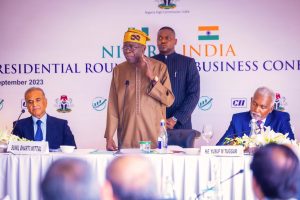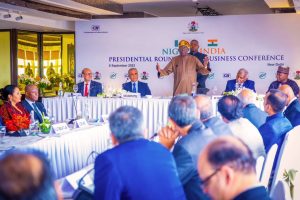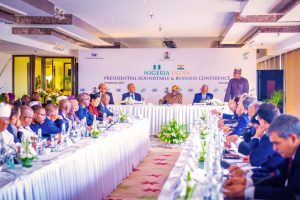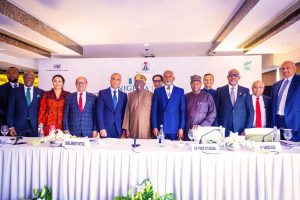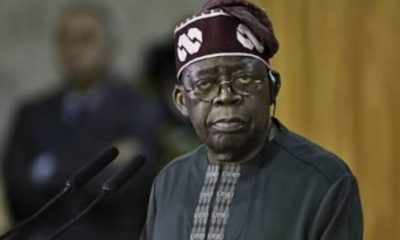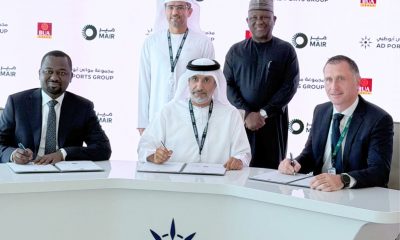Business
President Tinubu Urges Indian Investors To Accept Nigerian Offer Without Delay
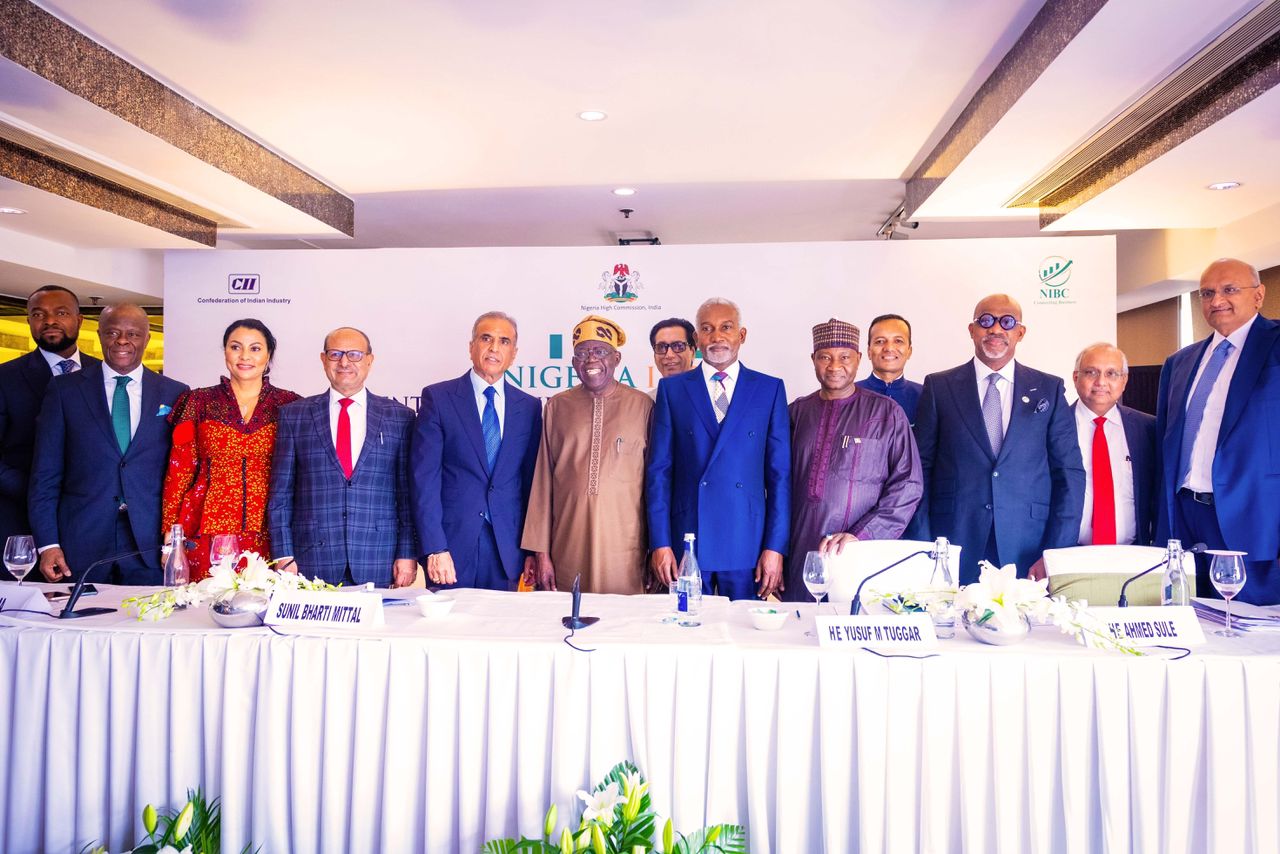
PRESIDENT TINUBU TO INDIAN INVESTORS: DO NOT PROCRASTINATE AS NIGERIA OFFERS THE BEST RETURN ON INVESTMENT; LAUDS $14 BILLION IN NEW INVESTMENT PLEDGES AT NIGERIA-INDIA ECONOMIC ROUNDTABLE
President Bola Tinubu on Wednesday commended Indian investors for significant investment pledges amounting to nearly $14 billion U.S. dollars committed during the Nigeria-India Presidential Roundtable and Conference in New Delhi, India, saying, “we are ready to give you the best returns for investment possible, there’s nowhere else like our country. Nigeria offers the best returns for investment today, so invest now.”
Among these many new investments, Indorama Petrochemical Limited has pledged a new investment of $8 billion U.S. dollars in the expansion of its fertilizer production and petrochemical facility in Eleme, Rivers State.
Jindal Steel and Power Limited, one of India’s largest private steel producers, has committed to investing $3 billion in Nigeria, following discussions with President Tinubu on the sidelines of the G-20 Summit in New Delhi, India.
Founding President of SkipperSeil Limited, Mr. Jitender Sachdeva announced that, following President Bola Tinubu’s personal intervention, he is investing $1.6 billion U.S. dollars in the establishment of twenty 100MW power generation plants across the states of Northern Nigeria, amounting to 2,000MW of new power within the next four years.
Additionally, the President has approved finalization on a new $1 billion U.S. dollar agreement to bring the Defense Industries Corporation of Nigeria (DICON) to 40% self-sufficiency in local manufacturing and production of defense equipment in-country by 2027 through a comprehensive new partnership with the Managing Arm of the Miltary-Industrial Complex of the Indian Government.
Another Indian firm, Bharti Enterprises, which is a major first-generation corporation in India with interests in telecom, space communications, digital solutions, insurance, processed foods, real estate, and hospitality, has expressed its commitment to invest an additional $700 million in Nigeria, with work set to begin immediately.
Emphasizing that under his pragmatic leadership, agreements must now manifest in industries and jobs on the ground in Nigeria, President Tinubu expressed gratitude to all Indian companies and individuals who have responded positively to his administration’s efforts to improve Nigeria’s macroeconomic and investment climate.
“Do not procrastinate. Don’t be frightened about investments in Nigeria. Bring it on. Ask your questions and make your requests. The trade and investment opportunities are enormous. I have a team, and I am the captain of that team, and I assure you that we solve problems,” the President affirmed.
Prospective investors were informed by the President, that in Nigeria, there is no free lunch or shortcuts, but that he has “good economic policy for the investors as well as able men and women in leadership and on the ground, who can drive the goal of broad prosperity through investment and infrastructure.”
“I will captain and lead the course of investment, development, and prosperity for the largest democracy in Africa and for investors from the rest of the world,” the President added, reiterating that Nigeria is open for business with intelligent, innovative, capable, and highly committed individuals in government, who are ready to drive the largest economy in Africa to destiny.
The President also told the Summit that “he is proud” that the Nigerian stock market had broken records in its consistent bullishness since he assumed office.
Minister of Finance and Coordinating Minister of the Economy, Mr. Wale Edun, who addressed the roundtable themed, “Building Partnerships with Renewed Hope for a Diversified and Prosperous Economy,” thanked Mr. Naveen Jindau, Chairman of Jindal Steel and Power Limited, for the new $3 billion investment in iron ore processing and steel development in Nigeria.
Commending the Tata group and so many others who have immediately responded to Mr. President’s bold and decisive moves to correct the major systemic faults in the macro-economic and investment climate in Nigeria, the Finance Minister noted, “I also wish to thank Mr. Sunil Bharti Mittal, Founder and Chairman of Bharti Enterprises, for his continued commitment to invest in the first phase at least $700 million dollars more in Nigeria,” Mr. Edun said.
Minister Edun further used the opportunity to explain the underlying principles of President Tinubu’s eight-point strategy, emphasizing that his agenda aims to promote growth and job creation, poverty reduction, food security, improved access to capital, inclusivity, business and citizen security, and fair play on a foundation of rule of law and anti-corruption.
On behalf of investors, Chairman of Bharti Enterprises, Mr. Sunil Bharti Mittal told the President, “You have unified the FX market. You have freed up crucial capital to upgrade your public infrastructure. Now, you have just dropped your prepared remarks and have spoken from your heart. Our investors have heard from a leader who is doing everything possible to attract capital to Nigeria for the benefit of Nigerians and our companies. Mr. President, we will bring these investments to Nigeria, and with your inspiring leadership style, we can only do more and more.”
Also, at the event, Nigeria’s Minister of Communication, Innovation and Digital Economy, Dr. Bosun Tijani, and his counterpart from India’s Ministry of Electronics and Information Technology signed a Memorandum of Understanding (MoU) for Co-operation in the field of Sharing Successful Digital Solutions, to be implemented at total population scale for digital transformation.
The Minister also signed an MoU with Central Square Foundation for Co-operation in the field of Sharing Successful Ecosystems, which involve interventions relating to education technology, to be implemented at population scale for digital economic transformation.
Under the watch of Nigeria’s Industry, Trade and Investment Minister, Dr. Doris Uzoka-Anite, a third MoU on Infrastructure Development was signed between the Infrastructure Corporation of Nigeria Limited (InfraCorp) and Invest India, the National Investment Promotion and Facilitation Agency of India, which helps investors looking for investment opportunities and options in India.
Closing the interactive session, Mr. Chandrajit Banerjee, the Director-General of the Confederation of Indian Industries (CII), noted that the Presidential Roundtable serves as a robust foundation for Indian businesses looking to engage with Nigeria and would encompass cooperation across key areas, such as capacity building, skills development, agriculture, and the enhancement of digital and physical infrastructure, among others.
“Under the determined leadership of President Tinubu, the CII is prepared to dispatch a high-level delegation to Nigeria, and we are keen on establishing a second presence in Africa, with Nigeria as our target destination,” he concluded.
The Presidential roundtable, attended by President Tinubu, also had in attendance Governor Dapo Abiodun of Ogun State; Amb. Yusuf Tuggar, Minister of Foreign Affairs;
Dr. Bosun Tijani, Minister of Communications, Innovation, and Digital Economy; and Dr. Doris Uzoka-Anite, Minister of Industry, Trade, and Investment; along with industry leaders from both India and Nigeria.
Following the Roundtable, the President met individually with each of the top pledging investors to finalize on the next steps to ensure that no environmental encumbrance stands in the way of their success in Nigeria.
Chief Ajuri Ngelale
Special Adviser to the President
(Media & Publicity)
September 6, 2023
Business
Nigeria’s Inflation Drops to 15.10% as NBS Reports Deflationary Trend

Nigeria’s headline inflation rate declined to 15.10 per cent in January 2026, marking a significant drop from 27.61 per cent recorded in January 2025, according to the latest Consumer Price Index (CPI) report released by the National Bureau of Statistics.
The report also showed that month-on-month inflation recorded a deflationary trend of –2.88 per cent, representing a 3.42 percentage-point decrease compared to December 2025. Analysts say the development signals easing price pressures across key sectors of the economy.
Food inflation stood at 8.89 per cent year-on-year, down from 29.63 per cent in January 2025. On a month-on-month basis, food prices declined by 6.02 per cent, reflecting lower costs in several staple commodities.
The data suggests a sustained downward trajectory in inflation over the past 12 months, pointing to improving macroeconomic stability.
The administration of President Bola Ahmed Tinubu has consistently attributed recent economic adjustments to ongoing fiscal and monetary reforms aimed at stabilising prices, boosting agricultural output, and strengthening domestic supply chains.
Economic analysts note that while the latest figures indicate progress, sustaining the downward trend will depend on continued policy discipline, exchange rate stability, and improvements in food production and distribution.
The January report provides one of the clearest indications yet that inflationary pressures, which surged in early 2025, may be moderating.
Bank
Alpha Morgan to Host 19th Economic Review Webinar

Alpha Morgan to Host 19th Economic Review Webinar
In an economy shaped by constant shifts, the edge often belongs to those with the right information.
On Wednesday, February 25, 2026, Alpha Morgan Bank will host the 19th edition of its Economic Review Webinar, a high-level thought leadership session designed to equip businesses, investors, and individuals with timely financial and economic insight.
The session, which will hold live on Zoom at 10:00am WAT and will feature economist Bismarck Rewane, who will examine the key signals influencing Nigeria’s economic direction in 2026, including policy trends, market movements, and global developments shaping the local landscape.
With a consistent track record of delivering clarity in uncertain times, the Alpha Morgan Economic Review continues to provide practical context for decision-making in a dynamic environment.
Registration for the 19th Alpha Morgan Economic Review is free and can be completed via https://bit.ly/registeramerseries19
It is a bi-monthly platform that is open to the public and is held virtually.
Visit www.alphamorganbank to know more.
Business
GTBank Launches Quick Airtime Loan at 2.95%

GTBank Launches Quick Airtime Loan at 2.95%
Guaranty Trust Bank Ltd (GTBank), the flagship banking franchise of GTCO Plc, Africa’s leading financial services group, today announced the launch of Quick Airtime Loan, an innovative digital solution that gives customers instant access to airtime when they run out of call credit and have limited funds in their bank accounts, ensuring customers can stay connected when it matters most.
In today’s always-on world, running out of airtime is more than a minor inconvenience. It can mean missed opportunities, disrupted plans, and lost connections, often at the very moment when funds are tight, and options are limited. Quick Airtime Loan was created to solve this problem, offering customers instant access to airtime on credit, directly from their bank. With Quick Airtime Loan, eligible GTBank customers can access from ₦100 and up to ₦10,000 by dialing *737*90#. Available across all major mobile networks in Nigeria, the service will soon expand to include data loans, further strengthening its proposition as a reliable on-demand platform.
For years, the airtime credit market has been dominated by Telcos, where charges for this service are at 15%. GTBank is now changing the narrative by offering a customer-centric, bank-led digital alternative priced at 2.95%. Built on transparency, convenience and affordability, Quick Airtime Loan has the potential to broaden access to airtime, deliver meaningful cost savings for millions of Nigerians, and redefine how financial services show up in everyday life, not just in banking moments.
Commenting on the product launch, Miriam Olusanya, Managing Director of Guaranty Trust Bank Ltd, said: “Quick Airtime Loan reflects GTBank’s continued focus on delivering digital solutions that are relevant, accessible, and built around real customer needs. The solution underscores the power of a connected financial ecosystem, combining GTBank’s digital reach and lending expertise with the capabilities of HabariPay to deliver a smooth, end-to-end experience. By leveraging unique strengths across the Group, we are able to accelerate innovation, strengthen execution, and deliver a more integrated customer experience across all our service channels.”
Importantly, Quick Airtime Loan highlights GTCO’s evolution as a fully diversified financial services group. Leveraging HabariPay’s Squad, the solution reinforces the Group’s ecosystem proposition by bringing together banking, payment technology, and digital channels to deliver intuitive, one-stop experiences for customers.
With this new product launch, Guaranty Trust Bank is extending its legacy of pioneering digital-first solutions that have redefined customer access to financial services across the industry, building on the proven strength of its widely adopted QuickCredit offering and the convenience of the Bank’s iconic *737# USSD Banking platform.
About Guaranty Trust Bank
Guaranty Trust Bank (GTBank) is the flagship banking franchise of GTCO Plc, a leading financial services group with a strong presence across Africa and the United Kingdom. The Bank is widely recognized for its leadership in digital banking, customer experience, and innovative financial solutions that deliver value to individuals, businesses, and communities.
About HabariPay
HabariPay is the payments fintech subsidiary of GTCO Plc, focused on enabling fast, secure, and accessible digital payments for individuals and businesses. By integrating payments and digital technology, HabariPay supports innovative services that make everyday financial interactions simpler and more seamless.
Enquiries:
GTCO
Group Corporate Communication
[email protected]
+234-1-2715227
www.gtcoplc.com
-

 celebrity radar - gossips6 months ago
celebrity radar - gossips6 months agoWhy Babangida’s Hilltop Home Became Nigeria’s Political “Mecca”
-

 society6 months ago
society6 months agoPower is a Loan, Not a Possession: The Sacred Duty of Planting People
-

 society5 months ago
society5 months agoReligion: Africa’s Oldest Weapon of Enslavement and the Forgotten Truth
-

 news6 months ago
news6 months agoTHE APPOINTMENT OF WASIU AYINDE BY THE FEDERAL GOVERNMENT AS AN AMBASSADOR SOUNDS EMBARRASSING

